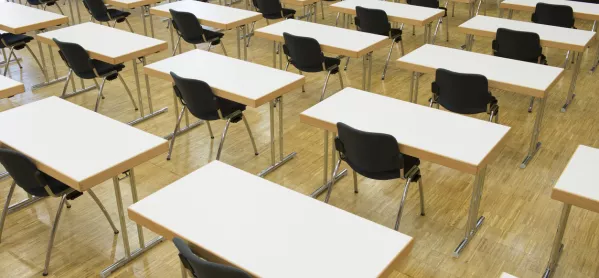At the best of times, exam season is a busy period at Leeds City College. But for the three days on which students sit their GCSE maths exams, all other classes are cancelled.
The reason is simple: the college’s resit cohort of 3,740 students is one of the biggest in the country. Across nine sites, staff from across all curriculum areas are drafted in for what head of English and maths Carol Layall describes as a “huge logistical challenge”.
“Every staff member volunteers for a role: either invigilation, exam access arrangements [EAA], one-to-one support, running exam papers or checking in students,” she says. “It’s a huge, huge event and it has a really good vibe.”
Read more: GCSE resits: DfE updates English and maths policy
Multiple resits: Students forced to sit exams 9 times
Comment: ‘Golden age’ of GCSE resits may be ending
The GCSE resits 'vibe'
To describe a maths exam sitting as a having a good “vibe” may sound surprising. After all, resitting GCSE maths poses major difficulties for many students.
Of the 161,139 entries last summer from students aged 17-plus, just 22.7 per cent resulted in a grade 4 “standard pass” or higher – down 14.3 percentage points compared with 2017. In the November sitting, the pass rate sat between 25 per cent and 28 per cent across the main exam boards.
At Leeds, however, staff are at pains to give students all the support they need. The college provides cereal bars, bananas, satsumas and bottled water, as well as a “maths pack” consisting of all the equipment needed for the exam.
A 45-minute “warm-up” revision session is held on the morning of the exams to prepare students for the gruelling exam.
Exam access arrangements
“It’s about getting everyone’s head in gear ready for the exam,” explains Layall. “This year we had a ‘headspace room’, so any students that just wanted some quiet time could go and switch off. That was manned by our wellbeing team.”
Providing additional support for learners is also a key part of the college’s work. This year, there were 1,800 EAA requests.
Arrangements can include everything from supervised rest breaks, additional exam time and alternative site arrangements to Braille exam papers, computer readers and questions printed on coloured paper.
This year, the college has invested in “reader pens”, which are held over printed words and read them out for the learners; around 60 learners at the college have been using them.
Exams 'in a familiar space'
And staff’s efforts seem to be paying off: on the day of the first GCSE maths exam, attendance stood at 90.2 per cent, the third successive annual improvement.
Rather than hiring external venues, Leeds City College uses classrooms for the students to sit their papers, and hires extra desks and chairs to make this possible. “It really is a familiar space,” explains Layall. “Students are taught in a classroom and, generally, sit their exams in a classroom. It’s not like having to go into a gym or somewhere they’re not familiar with.”
And the process of preparing students for exam season started months earlier. “We work on mindset when the students start,” Layall says. “Building up confidence, especially for the lower-grade learners. And also for the ones who have just missed out on getting a 4 at school: we do a smaller scale November resit for around 1,000 learners.”
But a positive outcome for an individual student is about much more than achieving that elusive grade 4, she adds.
“This is really helping us drive support for maths and achievement. We’re focusing on progress rather than just chasing the high grades. It’s about making those students feel confident and making progress in maths.”




